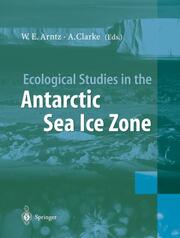Detailansicht
Ecological Studies in the Antarctic Sea Ice Zone
Results of EASIZ Midterm Symposium
ISBN/EAN: 9783642639739
Umbreit-Nr.: 5901507
Sprache:
Englisch
Umfang: xvii, 277 S.
Format in cm:
Einband:
kartoniertes Buch
Erschienen am 16.11.2013
Auflage: 1/2002
- Zusatztext
- Ten years ago Polar Biology published the book, Weddell Sea Ecology, containing the European "Polarstern" study EPOS in the Weddell Sea and Peninsula waters 1988/89. In certain respects, the present collection of papers, first published in Polar Biology in 2001, is a follow-up as it combines papers partly based on three "Polarstern" expeditions to the same region. Further articles relate to both land-based and shipborne studies, again primarily in the Atlantic sector and around the Antarctic Peninsula. The SCAR programme, "Ecology of the Antarctic Sea Ice Zone" (EASIZ), served as an umbrella for a truly international cooperation. Although funding came exclusively from national sources, 40% of the scientists on board "Polarstern" were foreigners. Out of the 35 papers of the present volume not less than 14 papers have multinational authorship. The scope of EASIZ is wider ilian the Southern Ocean Studies in JGOFS and GLOBEC. The Contents reflect emphasis on the study of benthos, which hitherto had not received the necessary attention in the attempt to understand key questions of evolution and zoogeography of fauna from the Southern Hemisphere. The information collected under EASIZ enhanced greatly our recognition of the rather high biodiversity of ilie Antarctic shelf benthos. In order to extend these studies to ilie deeper continental slopes and the deep sea, "Polarstern" is presently on her way for ilie first international survey of deep-sea benthos in the Atlantic sector of ilie Southern Ocean.
- Kurztext
- Until comparatively recently, the remoteness, inaccessibility, and extreme climate have meant that the vast pack-ice zone around the Antarctic continent was one of the least-known marine ecosystems on Earth. Myths and speculations prevailed in the literature, often derived from an anthropocentric way of thinking that considered the sea-ice environment as predominantly hostile to marine life. This picture has changed drastically now as a result of a series of international efforts, the most recent of which has been the highly successful EASIZ (Ecology of the Antarctic Sea Ice Zone) programme of the Scientific Council on Antarctic Research (SCAR). Focusing, in contrast to other international programmes, on life at the seafloor, EASIZ has attempted to link processes in the three major marine subsystems (sea ice, pelagic and benthic) within the pack-ice zone. Work has been carried out from both research ships and shore-based research stations. This work included organisms ranging in size from bacteria to seals and covered topics as diverse as biodiversity, iceberg scour, pelagobenthic coupling, autecology, and ecophysiology. Consequently, we now view the sea-ice zone as a rich system with highly adapted organisms, considerable natural disturbance from ice, low resilience and of great potential importance as an indicator for climate change.
